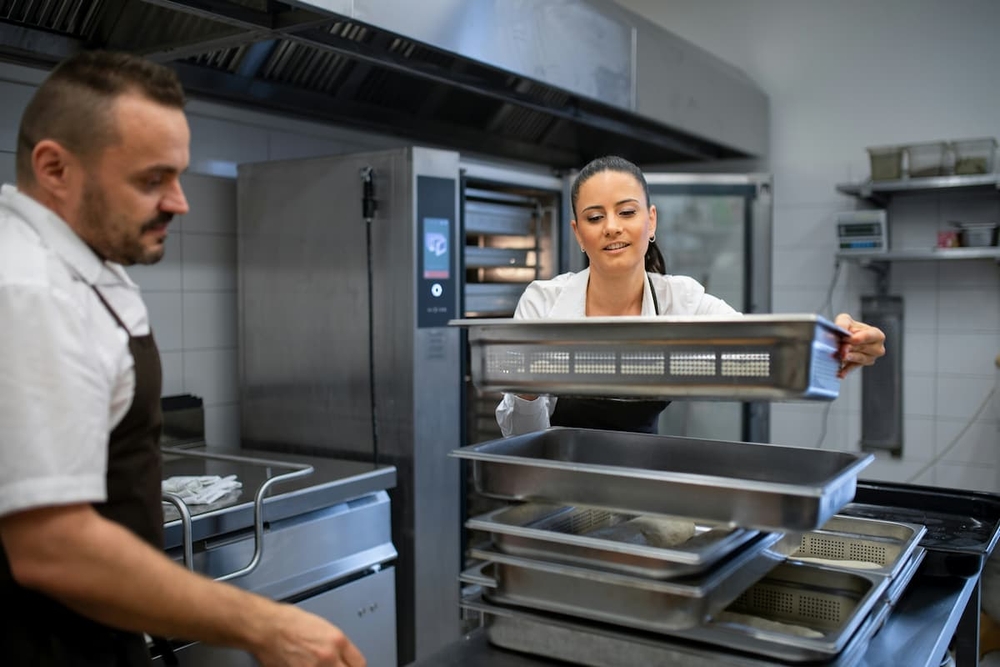Discover the benefits in how bulk food production boosts efficiency and profits
Table of Contents
CloudKitchens
How many tacos can be delivered from a 1000sqft restaurant?
The same amount as a 200sqft ghost kitchen.
Running a catering or meal prep business requires careful planning, efficient production, and cost control to ensure profitability. One of the most effective ways to achieve these goals is through bulk food production. By preparing large quantities of food at once, businesses can streamline operations, reduce costs, and maintain high-quality standards.
Bulk food production is a strategic approach that benefits caterers, meal prep services, and institutional food providers. Whether you’re catering for large events, supplying weekly meal plans, or managing corporate food services, producing food in bulk can enhance efficiency and profitability. Let’s see more about it!
What is bulk food production?
Bulk food production refers to preparing large quantities of food at once, rather than making individual meals or small batches. This method is widely used in commercial kitchens, catering companies, meal prep businesses, and institutional food services to optimize efficiency, reduce labor costs, and minimize food waste.
Businesses that adopt bulk food production leverage specialized kitchen facilities, such as commissary kitchens or shared kitchens, to prepare, store, and distribute food effectively.
Key benefits of bulk food production for catering and meal prep businesses
Bulk food production offers numerous advantages for catering and meal prep businesses, from cost savings to improved operational efficiency.
1. Cost savings on ingredients and supplies
One of the primary benefits of bulk food production is the significant reduction in food costs. Purchasing ingredients in large quantities allows businesses to take advantage of wholesale pricing, reducing overall expenses.
Cost-saving factors:
- Lower per-unit cost for ingredients
- Bulk purchasing discounts from suppliers
- Reduced packaging costs for meal prep businesses
Read more: How to start a catering business
2. Improved operational efficiency
Cooking in bulk streamlines kitchen operations, allowing businesses to maximize productivity. With efficient scheduling and batch cooking techniques, chefs can prepare food more quickly while reducing the time spent on individual meal production.
Efficiency benefits:
- Faster meal preparation and assembly
- Reduced need for multiple cooking sessions
- Less time spent on dishwashing and cleaning
3. Consistency in food quality and portioning
Maintaining consistent food quality and portion sizes is crucial for catering and meal prep businesses. Bulk production ensures uniform preparation techniques, resulting in consistent taste, texture, and presentation.
Quality control advantages:
- Standardized recipes and portion sizes
- Reduced risk of food quality variations
- Enhanced customer satisfaction and brand reputation
4. Minimized food waste
By planning meals in advance and cooking in bulk, businesses can significantly reduce food waste. Meal prep businesses, in particular, benefit from portion-controlled packaging, which helps eliminate excess food loss.
Waste reduction strategies:
- Pre-measured ingredient preparation
- Efficient inventory management
- Proper storage techniques to extend shelf life
5. Scalability and business growth opportunities
Bulk food production allows catering and meal prep businesses to scale operations without drastically increasing labor costs. By optimizing kitchen workflows and leveraging high-capacity equipment, businesses can accommodate larger orders and expand their customer base.
Scalability benefits:
- Ability to serve more clients with minimal additional labor
- Efficient meal prep for large-scale events or corporate catering
- Potential to expand into new markets, such as institutional catering
Read more: Essential guide to industrial kitchen equipment for ghost kitchens
Best practices for implementing bulk food production
To fully reap the benefits of bulk food production, businesses must adopt best practices that ensure efficiency, food safety, and profitability.
1. Invest in commercial kitchen space
Using a commercial kitchen or commissary kitchen provides access to professional-grade equipment, ample storage, and a well-organized workspace. These facilities support high-volume food production while reducing overhead costs.
2. Implement batch cooking techniques
Batch cooking involves preparing large quantities of food in stages, ensuring freshness while maximizing efficiency. Meal prep businesses can benefit from preparing staple ingredients in bulk and assembling meals as needed.
3. Optimize food storage and packaging
Proper storage techniques, such as vacuum-sealing and refrigeration, help maintain food quality and extend shelf life. Using portion-controlled packaging for meal prep ensures convenience and reduces food spoilage.
4. Streamline ordering and inventory management
Utilizing software for inventory tracking and supplier management helps businesses maintain optimal ingredient levels while preventing waste and stock shortages.
Read more: Restaurant Technology: Boost your business with the best technology trends
Industries that benefit from bulk food production
Several industries leverage bulk food production to improve efficiency and reduce costs:
- Catering companies – Large-scale event catering, corporate dining, and institutional food services rely on bulk production to manage high-volume orders.
- Meal prep services – Weekly meal plans and subscription-based food businesses optimize production with batch cooking and portion-controlled packaging.
- Institutional food services – Schools, hospitals, and corporate cafeterias use bulk production to serve consistent, high-quality meals efficiently.
Read more: How corporate catering can boost ghost kitchens?
Scale your food business with CloudKitchens
Bulk food production is a game-changing approach for catering and meal prep businesses seeking to enhance efficiency, reduce costs, and scale operations. By leveraging commercial kitchen facilities, adopting smart storage techniques, and optimizing production workflows, food businesses can improve profitability while delivering high-quality meals to customers.
At CloudKitchens, we provide state-of-the-art shared kitchen facilities designed to support bulk food production for catering and meal prep businesses. Our fully equipped kitchens offer flexible leasing options, streamlined operations, and expert support to help you scale efficiently.
Ready to optimize your food production and maximize profits? Contact CloudKitchens today to explore our kitchen solutions.
DISCLAIMER: This information is provided for general informational purposes only and the content does not constitute an endorsement. CloudKitchens does not warrant the accuracy or completeness of any information, text, images/graphics, links, or other content contained within the blog content. We recommend that you consult with financial, legal, and business professionals for advice specific to your situation.
More insights & stories
There’s more where that came from.
Get in the know and check out our additional insights


